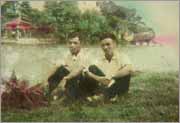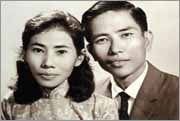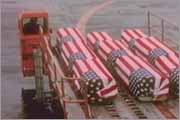|
|
 |  |  |
|
|
In 1968, on her 24th birthday, Barbara Sonneborn received word that her husband, Jeff, had been killed in Vietnam while trying to rescue his wounded radio operator during a mortar attack. "We regret to inform you…" began the telegram that arrived. Twenty years later, Sonneborn, a photographer and visual artist, set out on a search for the truth about war and its legacy. The result is a moving examination of the impact of war over time, eloquently chronicled in her debut documentary REGRET TO INFORM.
The National Asian American Telecommunications Association and POV, PBS's award-winning showcase of independent non-fiction films, present the broadcast premiere of REGRET TO INFORM on PBS on Monday, January 24, 2000, at 10:00 PM EDT (check local listings). The film was nominated for the Academy Award for Best Documentary Feature and won the Best Director and Best Cinematography Documentary awards at the 1999 Sundance Film Festival. When Sonneborn began this project in 1988, she had met only one other American war widow. Propelled by a desire to meet other women who had experienced the same loss on both sides of the war, and to understand what could be learned about war through their stories, Sonneborn put together a production team in 1990 and sent out several thousand letters searching for widows in the U.S. The women were difficult to find.
In 1992, Sonneborn traveled to Vietnam, accompanied by Nguyen Ngoc Xuan, a South Vietnamese woman whose first husband was killed in the war fighting for South Vietnam. Xuan later married an American soldier and moved to the U.S. in the early 1970s. She agreed to serve as Sonneborn's translator on the trip and to share her own story in the film. On their journey through Vietnam - where some 2 to 3 million people were killed during the war - they found that everyone had a story to share about loss and devastation from the war. "[The women in Vietnam] were quite surprised and very moved that an American widow wanted to hear their stories," Sonneborn recalls. "The women recounted in painful detail the human and environmental damage caused by what they call the American war in Vietnam." One woman in the film describes, "The cruelty we experienced was longer than a river, higher than a mountain, deeper than an ocean." Another adds, "If you weren't dead, you weren't safe."
"Making this film has been Jeff's gift to me," sums up Sonneborn. "It has expanded my understanding of sorrow and suffering, of love and joy. I want people to see war differently than they've seen it before. I want them to look war in the face and ask themselves, 'Am I going to allow this to happen ever again?' I want people to so deeply realize the humanity of other human beings that they won't be able to kill them."
| ||||||||||||||||
|
home | online memorial | program info | background | resources | get involved NAATA | POV | |


